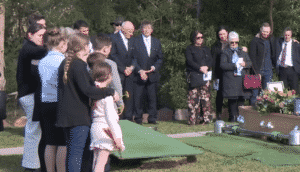How Are the Children and Grandchildren Coping With The Loss of a Loved One?

When someone passes and the family is grieving and trying to make all the necessary arrangements, how the children and grandchildren are coping with the loss of their loved one is often overlooked, partly because children may express their grief in ways that are very different to that of adults.
In this article we’ll explore grief and loss in relation to developmental phases before looking at the emotion’s children may experience, the ways they may express them and ways that you can ease them through the process.
They may feel sadness, guilt, frustration, fear/panic (People can just go away forever without warning!), anger (He didn’t say goodbye, all of the attention is on someone else, not me!) relief, disbelief, confusion, anxiety, numbness BUT they MAY SHOW NO OBVIOUS SIGNS as they don’t know how to express such strange, strong emotions. (I use the term strong emotions/big feelings as the traditional labelling of emotions as good or bad, makes many of the emotions associated with grief seem unacceptable.)
How children understand death according to their age/stage of psychological development
Babies
Babies have no concept of death but are likely to cry at the sudden separation, including from the surviving parent who is suddenly not as available.
Toddlers
Toddlers through to 5-year-olds will pick up on the emotions of the adults around them but may not understand that death is permanent unless they’ve experienced the death of a pet or another loved one. Pre-schoolers are likely to think the deceased can come back to life just like in the cartoons. Frequently, at this age, death is explained as someone going to heaven. Being at an ego-centric stage of development, where they think everything is about them, they may think they have somehow caused the person to die and may feel guilt and shame.
School-aged
School-aged children understand everyone dies and that it’s permanent. They may be curious about the process of dying and ask questions. They often fear the unknown, the loss of control and separation from friends and family.
Teenagers
Teens understand the permanency but may not have experienced the death of a friend or pet. Given they’re at a stage where they see themselves as immortal, death can be very confronting and may result in denial or defiance. They might feel they can’t talk with their parents as well as feeling they don’t belong with their peers at a time of development which is all about creating their identity.
Signs of grief shown by children may include:
- Trouble concentrating/making decisions,
- Becoming easily confused
- A decline in school performance, motivation or even self-esteem
- Nightmares
- Emotionally, young children can be crying one minute and playing happily the next.
- They may be unsettled, more clingy/needy than usual and more anxious about separation.
- Children could feel responsible for the safety of others, feeling the need to protect them.
- They may have more headaches, stomach aches, tiredness, lethargy or hyperactivity. Perhaps these are ways of staying close to their family at a time where they’ve suddenly learnt that people can just go and never come back.
- Eating, sleeping & social behaviours may change and bed wetting may return.
- They may ask questions about why the person died or where they’ve gone.
- Behaviour may become more challenging as they seek attention and reassurance.
- Play and drawings may reflect themes relating to death.
How to support children after the loss of a loved one:
- Try to maintain their routines – routines provide structure and a feeling of safety at a time when the child is feeling very scared.
- Reassure them that they are loved and will always have people to look after them.
- Reassure them that it’s NOT their fault. (Until around the age of 7, psychologically children think everything is about them so they find evidence to support this idea which causes tremendous guilt.)
- Let them know it’s okay to play and have fun even though the grownups are sad. This includes playing with friends.
- Make time to talk about what’s happened. Let them ask questions. (Find someone who can do this if you can’t. Advise the school so they can provide support and make allowances for behaviour changes.)
- Talk about your ‘strong feelings’ and encourage them to do the same, knowing they may not have the language to express what they’re feeling. Talk about how you deal with the strong feelings (crying, shouting into a pillow, punching a pillow, jumping, running, riding a bike… (This is where play, painting, drawing etc. allows an outlet – Talk about the colours… what’s this bit mean, what’s happened here? rather than saying ‘it’s a nice picture.’)
Allow children to attend the funeral or memorial service and speak to the Celebrant about how they could be included.
- Margie McCumstie from Metamorphis Ceremonies always welcomes children to be involved, whether it is by placing art or cards on the casket, helping them say a short eulogy or by using a simple story to explain death specifically for the children present.
- Create a special book or a memory box to help them remember the person.
- Create a DNA piece of jewellery or keepsake. Allison Ockenden from Today, Tomorrow & Always specialises in creating beautiful items using ashes, hair and other DNA. This gives the child something personal and meaningful to keep and hold.
- Let them know the person will always be with them in their heart.
- When you snap/do something you regret, accept you’re doing your very best as you grieve. You don’t need to beat yourself up on top of everything. Apologise to the child, explaining you were having some ‘strong feelings’. Again, this normalises the child’s feelings and makes it okay to talk about them as well as modelling apologising when we make mistakes.
How do you talk to the kids?
- Let them know as soon as possible.
- Explain it in language they will understand at their age
- Use words like died & death rather than ‘gone to sleep’, ‘passed away’ as they are ambiguous and can lead to a fear of going to sleep! Calmly answer all their questions as many times as it takes
- Use story books to help explore death (Schools and local libraries will be able to advise you on the most appropriate ones. John Brown, Rose and the Midnight Cat is a good story as it takes the reader through the feelings, especially those associated with someone new arriving in the family). Margie from Metamorphis Ceremonies is a Celebrant and qualified Early Childhood teacher. She recommends “Water Bugs & Dragonflies” by Doris Stickney to help children understand. Other books to consider are “Love You Forever” by Robert Munsch and “Toby” by Margaret Wild.
Listen to them!
- Try to listen, even if you don’t have all the answers. (You can contact the parents helpline in your state and the children can contact The Kids Helpline – phone 1800 55 1800, Webchat, and email. You can also refer to this article on helping children to identify and express their emotions https://kidshelpline.com.au/parents/issues/helping-kids-identify-and-express-feelings. If you are on the Gold Coast, contact Paradise Kids who have programs to help families going through big changes including a death in the family. They have programs for children aged 4-12 as well as private play therapy sessions for your children.
- You can also message or call me to arrange a free 15-minute chat to find out more about what I do, how I can help etc. (Julia Williams)
Recommended Contacts to help following the death of a loved one:
Funeral & Memorial Service – Videographer/ Live Streaming

Pauls Productions Compassionate Farewell Video
- Paul Sheaffe
- Pauls Productions Funeral Video
- paul@paulsproductions.com
Counsellor
Julia Williams
- (Graduate Diploma in Counselling)
- https://www.facebook.com/JuliaWilliamsCounselling
- Phone 0450 001 486
Funeral/ Memorial Celebrant
 Metamorphis Ceremonies
Metamorphis Ceremonies
- Margie McCumstie
- www.metamorphis.com.au
- www.facebook.com/MetamorphisCeremonies
- www.linkedin.com/company/metamorphis-ceremonies
- Call 0424 041212
- Email margie@metamorphis.com.au
DNA Artistry, Jewellery & Keepsakes
 Today, Tomorrow & Always
Today, Tomorrow & Always
- Allison Ockenden
- https://www.todaytomorrowalways.com.au
- Email: allison@todaytomorrowalways.com.au
Eulogy Writing Service
 Love Legacy
Love Legacy
- Margie McCumstie
- www.lovelegacy.com.au
- www.facebook.com/LoveLegacyEulogies
- Call 0424 041212
- Email margie@lovelegacy.com.au
Thankyou for reading. Please feel free to share this article with acknowledgement of the authors, contributors & Pauls Productions.





